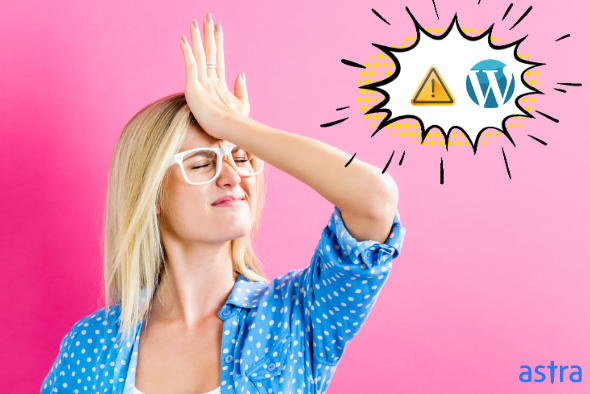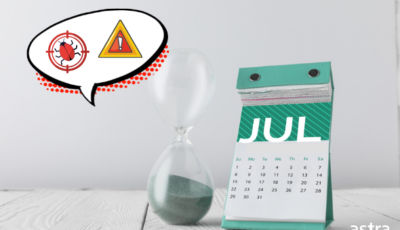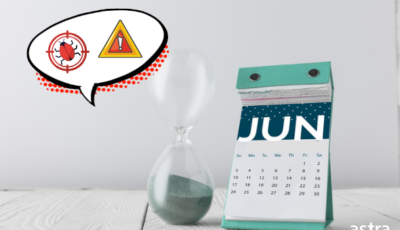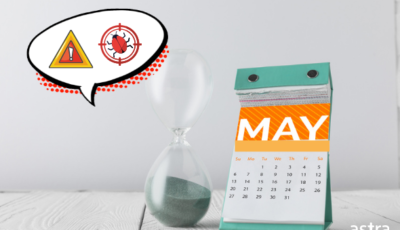Article Summary
One of the reasons WordPress has become so widespread is that it’s a breeze to use, sporting a very intuitive UI, simple drag and drop technology, and a number of features which make your life much easier. It’s well-known that even someone who’s never touched WordPress can get a hang of it in less than a day. But that doesn’t mean you can’t do any wrong with it. Mistakes do happen when people use WordPress, and quite often at that.
There’s no denying the popularity of WordPress. It powers around a third of all known internet sites, making it a giant among content management systems. One of the reasons it became so widespread is that it’s a breeze to use, sporting a very intuitive UI, simple drag and drop technology, and a number of features which make your life much easier. It’s well-known that even someone who’s never touched WordPress can get a hang of it in less than a day. But that doesn’t mean you can’t do any wrong with it. Mistakes do happen when people use WordPress, and quite often at that. In fact, we’ve compiled a list of the most common WordPress mistakes. We’ll also show you how best to avoid or solve them.
With that said, here are 7 common WordPress mistakes almost every newbie makes in WordPress.
1. Choosing a Poor Host – Common WordPress mistakes
It’s unfortunate that so many people are unaware of just how vital it is to find a quality hosting solution for their websites. The truth is that the right hosting provider can help your site grow greatly, and discarding its importance could have you hitting a brick wall.
Which means that:
It makes sense to do some research before deciding on the right host – and that mainly depends on what your needs and limits are. For instance, do you need managed or dedicated hosting? Can you actually afford it? What about scalability? Around the clock support? Security? These are just some factors you should take into account.
Luckily, WordPress is a tremendously popular CMS, so there are loads of hosting options, and a vast array of resources you can utilize to learn about the quality of their services.
Related article – Shared Hosting Security Risks
One of the best WordPress hosting in terms of management, features, infrastructure, support & security is Themecloud. Astra comes in-built with all Themecloud websites.
2. Ignoring Updates – Common WordPress mistakes
Few folks actually think about routinely updating WordPress and its other associated pieces of software, like plugins.
It’s a bit weird, isn’t it?
After all, updates are massively important for keeping your site alive and kicking.
Updates tend to come up for two reasons.
- Firstly, they’re made to patch security vulnerabilities.
- Secondly, they fix glitches that cause problems for users.
Granted, there are also added features, but these two make up the most updates. So, by not updating, you risk being attacked by hackers through already well-known methods. What’s more, you have to endure bugs the community has already fixed.
There is no underestimating how much better off you’ll be if you regularly keep up with updates. Updating WordPress sounds like a bother, but it’s hardly a hassle. Which means it isn’t a reason not to update whenever necessary.
Note – Check the latest version of WordPress.
3. Missing a Caching Plugin – Common WordPress mistakes
Site speed matters a great deal – people usually expect your site to load within 3 seconds.
Now:
That’s an awful lot for a website to do in a very short period of time, as you can see here:

A slow website will drive away visitors, and that’s clearly bad SEO optics. That’s why you ought to do as much as you can to increase its load speed. Caching plugins are a great tool to achieve that.
With these plugins you can shave off a lot of load time, rocketing your dwell rate. Seeing that we’re dealing with a time frame as miniscule as 3 seconds, every bit helps.
Here’s the deal:
Not having a caching plugin to help you out can make the difference between life and death for your website.
There are quite a few plugins to choose from. As always, you should look up which ones are worth your time. IsitWP can help you out with a handy guide that compares 7 best caching plugins for WordPress.
4. Unoptimized Images – Common WordPress mistakes
Another aspect of site speed, image optimization is a big part of creating a positive user experience. Site makers neglect to properly optimize the images on their websites far too often, always to their detriment.
Here’s the good news:
There’s loads you can do to optimize your images. For one, you could scale and compress them (both lossy and lossless have their merits; it’s ultimately up to you) so that they don’t bog down your site. You could also make use of content delivery networks that serve images quickly. Not to mention the good old alt text, which needs to be descriptive of its respective image.
These are just a few of many things you can do, and for the sake of this article it won’t do us too much good to go through each and every tip. There’s a great article by Online Media Masters that goes through the essentials of image optimization, and it should definitely give it a read.
5. Using the Default URL Structure – Common WordPress mistakes
How many times have you looked at your browser’s URL bar while on some website only to be greeted by a barrage of question marks, exclamation marks, and incomprehensible strings of numbers and symbols?
Probably quite a few. I know I have.
Organizing your URL structure like this may be easier in the short term, but it ultimately fails to live up to your SEO potential. Creating a comprehensive URL layout for your website makes it easier for humans to navigate it, and sprinkling the URLs with keywords helps bump you up the SERP.
Here’s a quick checklist you can rely on for help:

WordPress used to pay little heed to SEO-friendly URLs (commonly referred to as permalinks) in the old days, leaving their slugs a jumbled mess of random characters.
Luckily, from version 4.2 on, WordPress has made it easy to create neat looking URLs. You can click on the Permalinks option in Settings and select a preset URL pattern or customize them yourself.
6. Not Backing Up When Installing Plugins or Updates – Common WordPress mistakes
Imagine having your work, which you toiled over for hours upon hours, all go down the drain in a matter of seconds after a glitch or incompatibility issue, or even worse – a hack! And to think that you could have prevented this disaster (or at least reduce its results) by having a backup saved.
This is the thing:
Plugins or updates can sometimes cause problems with your website, usually because other parts haven’t been updated yet. In that case, it’s a good idea to have a backup plugin ready for when disaster strikes. It’s an even better idea to manually create backups yourself. Otherwise, you’re just opening yourself up for potential setbacks at best.
7. Using Too Many Plugins – Common WordPress mistakes
With over 50 thousand plugins that fulfill a multitude of functions, it’s easy for a WordPress user to get a little plugin-drunk. They provide so many quality of life improvements that it’s hard to resist installing as many as possible. But those that succumb to the temptation soon find that they were better off without.
Putting aside the dramatic tone, there’s a serious downside to implementing too many plugins.
Here’s the catch:
Plugins reduce your site’s speed. Of course, a site riddled with plugins has a hard time loading quickly enough, losing the interest of anyone visiting it.
Thus, the best solution is to stick with the plugins you know you’ll need. Install the essential ones (such as Yoast, BackupBuddy, or MonsterInsights) and add others you’ll get a lot of mileage from. It goes without saying that you should get these from reliable sources, and that you need to update them regularly.
8. Not Having Proper Security – Common WordPress mistakes
The frequency and magnitude with which websites are getting compromised today is astonishing. One in three websites is hosted on WordPress or using it as a CMS. Threats a WordPress site face is also proportional. Not opting for a continuous and comprehensive monitoring solution can prove to be more pricey than actually paying for one.
Astra WordPress Security Suite is one such solution, which will ensure that your website is monitored and protected 24×7 with its firewall. It blocks SQLi, XSS, CSRF, bad bots, OWASP top 10 and 100+ other cyber threats. Further, our automated malware scanner can be availed on a click from your dashboard and scans your website in less than 10 minutes and takes even lesser time for subsequent scans.
Summing Up – Common WordPress mistakes
These were a few common mistakes you could have been making unconsciously. These mistakes if avoided, could make your online game much easier and safer on WordPress. Apart from these, here are the 18 things you must do after installing WordPress.
Also, in case, we missed some mistakes you made, comment below. We would love to hear ?
















